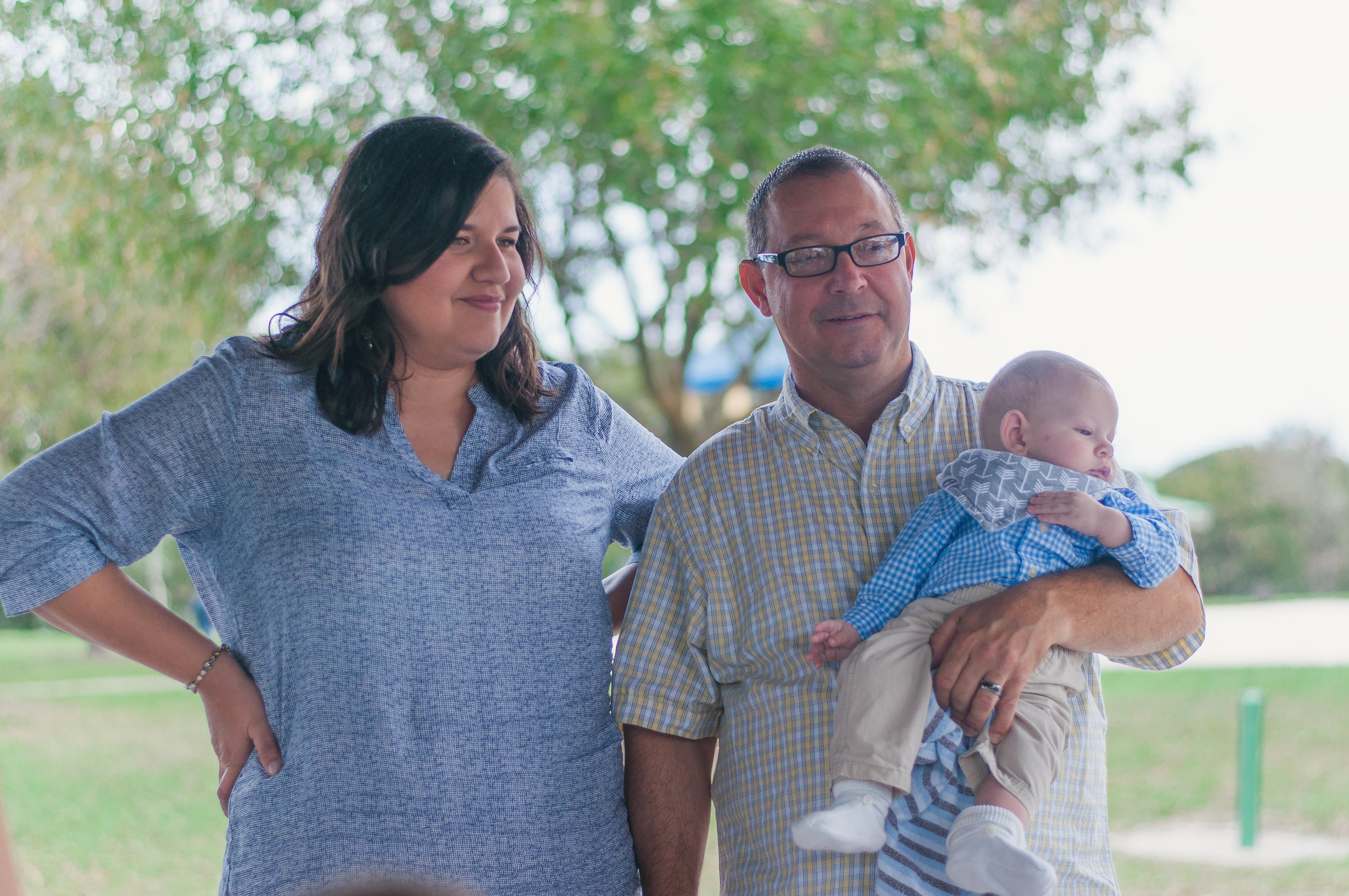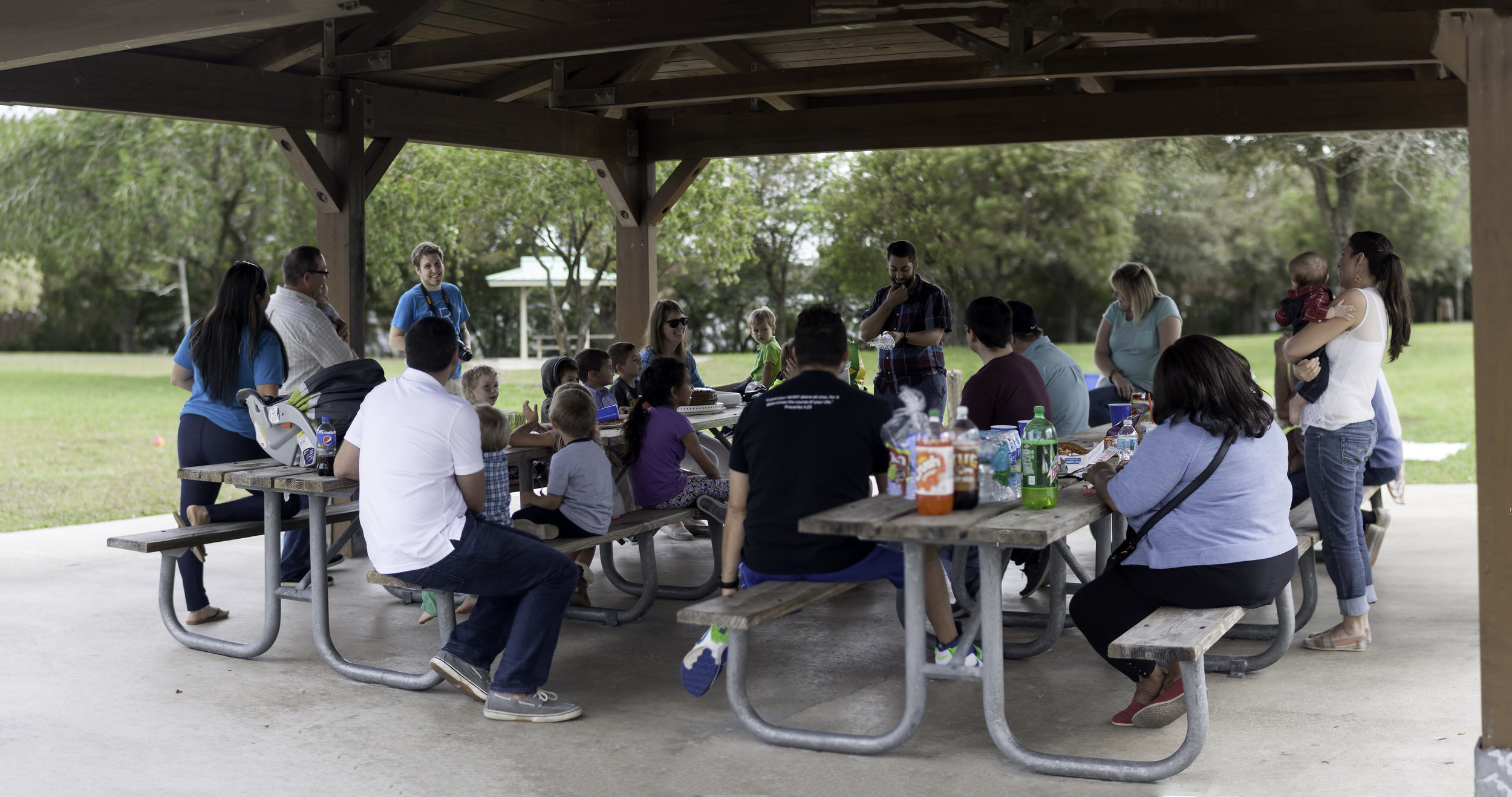
















We will all face our own times of trouble. Peter tells us that we should not be surprised when testing and trials come (1 Peter4:12), and James encourages us to approach our trials with joy knowing that trials and temptations produce endurance (James 1:2). Whether they be personal, family, ministry, or other in nature, they will come, and we ought to be ready.
In Genesis chapter 26, Isaac experiences his own difficulty, a famine. In the first five verses, we are reminded of 4 major truths about facing difficulties in life:
1. We have to experience our own “famines"
It’s specifically said in verse 1 that “there was a famine in the land, besides the former famine that was in the days of Abraham.” The writer is making clear that Isaac is about to experience something that is not new to people, but new for him. We should, and can, learn from the sufferings and experiences of others, but God knows that there’s no teacher quite like experience.
2. We need to go to God
In verse two, the Lord appears to Isaac and says:
”Do not go down to Egypt; dwell in the land of which I shall tell you."
If you’re familiar with Bible symbolism, you’ve probably heard that Egypt often depicts the world and it’s system, which are against God and His ways. Just as He tells Isaac to trust Him, rather than Egypt, and to go where He says, rather than what would make sense, God also tells us to go to Him in times of difficulty.
3. Our trials will bless us
God gives Isaac a promise that if he would go into the land that He told him, He would bless him and his offspring. Similarly, when we use our trials as a time to act in faith towards God, He promises that our trials will turn into blessings (James 1:2).
4. Our trials will bless others
In addition to blessing himself, God reminds Isaac that He doesn’t bless people in a box. He blesses us so that we may in turn be a blessing. In Isaac’s case, it means the lineage that would bring the Savior of the world. In our situations it could mean a new empathy or increased character that God will use. Or it could mean a testimony that will be shared in the future or an example set for other believers. God has many uses for our trials, and it’s important to remember that He has a much bigger picture in mind than just ourselves.
If you are going through a trial of ministry, family, personal wellbeing, finances, etc. I hope you take God’s Word to heart and press on knowing that He is good.
“We don’t like their sound, and guitar music is on the way out.”- Decca Recording Co. rejecting the Beatles, 1962.
“Heavier-than-air flying machines are impossible.”- Lord Kelvin, president, Royal Society, 1895.
“Stocks have reached what looks like a permanently high plateau.”- Irving Fisher, Professor of Economics, Yale University, 1929.
“Man will never reach the moon regardless of all future scientific advances.” -Dr. Lee De Forest, inventor of the vacuum tube and father of television.
“Everything that can be invented has been invented.”– Charles H. Duell, Commissioner, U.S. Office of Patents, 1899.
We are all touched by unbelief in one way or another. Many of us see it as a harmless, healthy dose of doubt that we need from time to time. But God sees unbelief as rebellious sin! When God brought the children of Israel to the promised land, they sent spies ahead to scope out the land. Ten of the spies came back with a report full of fear, lies, and doubt. The people listened to these men, rejecting Caleb and Joshua’s full-of-faith testimony that God could do what He was leading them to do.
The result was that the children of Israel were given 1 year of judgment for each day the spies were gone: which equaled 40 years! Each one of the fathers, mothers, uncles, aunts, and grandparents would perish in the wilderness, with only the next generation and Caleb and Joshua being allowed to enter in.
The application here is dramatic: are you living a paralyzed life of unbelief? What is God calling you to do? Where is He calling you to go? He wants to bring you into the fullness of the promised land, a land flowing with milk and honey, but your faith is the admission ticket! Throughout the Gospels it was unbelief that Jesus marveled at, and often would not do miracles where people were doubting. Don’t allow Satan to whisper his lies to you anymore.
Remember this familiar quote?
“You will not surely die. For God knows that in the day you eat of it your eyes will be opened, and you will be like God, knowing good and evil” —Satan to Eve in the garden of Eden.
“Therefore, as the Holy Spirit says: “Today, if you will hear His voice, Do not harden your hearts as in the rebellion, In the day of trial in the wilderness, Hebrews 3:7-8
Whether we like it or not, work takes up a lot of our lives. If you include your job, housework, errands, and the like, you will spend at least half of your life doing “work”. As our God has told us to “redeem the time” and “make the most of every opportunity," it is necessary for us to realize how to worship God in our work.
So often, work is viewed as punishment. However, this is not the way God primarily views work, and neither should we. True, if a child breaks something, you might have them “work it off” with chores in order to help instill in them them the value of things and to care for the things we have. However, the original purpose of work is not punishment, but an opportunity to worship God. Contrary to common thought, work was not instituted as a punishment of sin. It begins before the fall of man and sin entering the world in Genesis 2:15:
“The LORD God took the man and put him in the garden of Eden to work it and keep it."
The very first “job” was a groundskeeper for God’s garden, Eden. Could you imagine having the privilege to take care of God’s original creation? I don’t know if animals came to assist Adam and Eve as they did Snow White, but I’m sure it was a glorious endeavor nonetheless.
If God instituted work before the fall, then that makes work an inherently good thing. God did say that work would become more difficult and painful because of the fall (Genesis 3:17-19), but that doesn’t negate it’s original design. Remembering that God instituted work before the fall helps remind us that God has a purpose for us in our work that is outside of living in a world ruined by sin and its affects. That purpose is to worship God, to give an “expression of reverence” towards God, in our working. And just as in every other area of life, we do this by living out God’s initial intent and purpose for our lives regarding our work.
Many people assume that the only “worshipful” work is one of a pastor, staff member of a Christian organization. The truth is that God doesn’t separate between the spiritual and the secular when it comes to worship. Anything can be done in worship to God, as we saw 2 posts ago in the “Worship in Action” post, and this includes work. Whether working as a pastor, CEO, garbage man, barista, app coder, or the thousands of other possibilities, you can worship God while at work.
The first major piece to worshiping God at work is not abusing our authority at work.
In Luke 3, John the Baptist is calling people to repentance and proclaiming that judgement is coming. There were three groups of people we see asking John what repentance looks like in their situation:
1. The Crowds. Verses 10-11 tell us that the crowds (generically, everyone) asked John what repentance meant for their life and he said that if they had two tunics, to share one with someone who didn’t have one, and whoever had the same with food, should do the same. Generically, we are told to be caring for one another. To be generous, and love one another as we would like to be loved.
The following two groups shed more light on our situation with work:
2. The Tax Collectors. Verses 12-13 shows the tax collectors coming to John and asking what they should do. It may come as a surprise to you, but John didn’t tell them to quit their jobs. Tax Collectors were the most hated of all people in Israel as Rome decided to hire Jews to tax their own people so they were viewed as traitors serving an oppressive government. The money they took from the people paid for the salaries of many an unjust soldiers who were known for oppressing the Jews on a personal level. To make matters worse, many of these tax collectors would demand more from the people than Rome did. For example, if Rome wanted 20% of a person’s salary, it wasn’t uncommon for a tax collector to charge 25% and then to pocket the additional 5%. If a Jew refused to pay the higher price, then they would be arrested for not paying taxes. The system was very corrupt. However, John’s response wasn’t to quit their jobs and remove themselves from what many considered an already oppressive government. Instead, John told the tax collectors to only collect what Rome told them to. Essentially, he told them not to take advantage of their position by hurting others.
3. The Soldiers. Verses 14-15 tell us that the soldiers were told a similar thing to the tax collectors - to not take advantage of their position over others. To not enjoy the “perks of the job", that hurt others.
What we can gain from this passage is this: not all "perks of the job" glorify God. I worked as a barista for a few years, and it was assumed that your friends would never pay for drinks. I was pretty much the only one who didn’t go along with this mentality, because unless my employer said to give it for free, it is not my position to give away free drinks. It’s a simple example, but every job is given some level of authority, but it is your choice to use that authority to worship God, or not.
The second major piece to worshiping God with our work is that we ought to work hard and well. Paul writes in Ephesians 6:5-8,
"Bondservants, obey your earthly masters with fear and trembling, with a sincere heart, as you would Christ, not by the way of eye-service, as people-pleasers, but as bondservants of Christ, doing the will of God from the heart, rendering service with a good will as to the Lord and not to man, knowing that whatever good anyone does, this he will receive back from the Lord, whether he is a bondservant or is free."
As described in this passage, Christians ought to be the best employees ever! Paul is saying that we should work to the very best of our ability, as if Jesus were our direct boss in the workplace. This means that we should not be known as lazy in the office. That we should not use our time unwisely, or take unnecessary breaks (time theft really is stealing). As Christians, we should work hard to do our job well, and with a desire to bless our employer/boss.
I love the way Martin Luther King Jr. described how a Christian should work:
“If it falls to your lot to be a street sweeper, sweep streets like Michelangelo painted pictures, sweep streets like Beethoven composed music ... Sweep streets like Shakespeare wrote poetry. Sweep streets so well that all the host of heaven and earth will have to pause and say: Here lived a great street sweeper who swept his job well.”
What an awesome way of putting it. We should work hard, and work well, not so that we may receive glory from people, but from God. Because as we work hard, we are giving a testimony and witness to the God who gave us that job. To the God who created the concept of work, and desires us to work well. This is how we give worship to God in our work.
The work of church planting is a crazy, exhilarating, draining, rewarding and faith-filled ride. It’s a different life than you lived before in many ways. Many of us left our homes and communities and immersed ourselves in a new place with new people and new surroundings. We’ve seen God provide for our families and our churches in miraculous ways. We’ve been moved to tears when we see a person drawn to Jesus for the first time. It’s often hard, but we wouldn’t choose anything else because God has called us to it and He is leading us faithfully! And yet, in this extraordinary work that God is doing in and through us, it becomes easy for us to forget that God’s love for US is what has compelled us to serve in these unusual ways in the first place.
It has been said that God calls some to pastor (or to marry a pastor) just to keep that person that much closer to Him. God’s calling on your life is not merely to accomplish a mission through you. You are His mission as well! Have you seen God change you through this journey you’re on? I know that through our church planting journey, my relationship with Jesus has become more real and more a part of who I am than at any other time in my life. God knew this when He called me and when He called you. Never forget that it was His love for YOU that changed you and led you to this place in your life. It is his kindness to YOU that caused you to listen when He called you to plant a church.
Don’t lose sight of this. Church plant or not. Pastor or not. Leader or not. God loves you. Let this simple message wash you today and reassure you. He doesn’t love you for what you do or how you may or may not see yourself or your ministry. Even if nobody else comes to your Sunday service, God is there to teach YOU. His mercies for YOU are new every morning. So, whatever your day or week looks like, be refreshed in the truth that Jesus is with you and will accomplish what He began in you from the very beginning. Your Saviour, your God. Remember Him and His love for you today.
Be blessed,
Daniel Williams
Happy New Year!
As we enter 2016, we want to look back and celebrate all God has done this past year. Below you can see a recap of our year at Redemption Church and join with us in thanking God today for the great things He has done! We want you to know that you have been a part of this special work through your prayers and support for us. We are remembering with you so that we can look ahead to this new year with expectation and faith in who Jesus is and that He has great things in store! We pray that you are blessed this year as you pursue and proclaim Jesus in 2016!
There are few things more terrifying than feeling like you are truly lost. Not lost in a neighborhood looking for someone’s house. Not lost like straying away from camp, but still within earshot of help. What I mean is truly, and helplessly lost. So lost that no one can hear you. So lost that nothing looks familiar. So lost that you feel helpless, and truly alone. That is terror. It’s harder and harder to actually get lost today. GPS and other devices help us stay along the paths. The help us navigate to places we have never been before in a calm, clear voice. We’re hardly ever alone, and lost.
But it still happens. People try to escape the everyday, and leave their GPS and smartphones behind to get as close as possible to being lost, but stay safe. Sometimes people cross the line that divides safe and lost, never to return. Adventurers and weekend warriors have been pushing their own boundaries for decades, with large numbers of success. So what happens to get people lost? How is this possible in our modern country today?
I recently read a story about a P.E. Teacher from Seattle that got lost for a week inside Olympic National Park fighting for her life. She had planned on climbing Mt. Rainier, but her partner canceled at the last minute, so she changer her plans. Mary O’Brien left Seattle with every intention of buying a topographical map of the area she was hiking. Her plans included an 18.8 mile loop through the North American Rain forest. Thirty hours in, she was crossing cat creek with white water surging beneath her, she was bruised, and starting to hallucinate. A few hours earlier she had encounter an early fog, darkness, and snow. Mary slipped in the darkness and as she climbed back up to the trail, she took a wrong turn.
What followed was a week long survival expedition. She was running out of food, and conditions were getting worse. She climbed up the side of a nearby mountain and started signaling for help with her headlamp. When no one responded, she took a compass bearing, and set a straight coarse for the lights. Mary eventually came to a lake where some boaters rescued her, but her story is our story in life.
We go through life with out really thinking things out. Planning for the treacherous journey, and making sure we stay on the trails. Mary failed to bring a map, or even leave a note in her parked car, so no one knew where she was. No one could even look for her. So often we stray off God’s path. We slip and fall, get disoriented, and try to pull ourselves back up. Only to find they we have wandered so far off the course, we start hallucinating visions in the wrong direction. We end up chasing ghosts, and wind. When were lost, the sense of panic sets in and we make worse decisions. Mary decided she needed to climb up to see light. She got her bearings, and went straight for it, no more side trails, no more change of direction, no more wandering.
If you feel lost, you can look out and see God. Maybe you can even remember where you strayed, but can’t get back now. So what can you do? You start by looking in the right place. Jesus said in Matthew 7:7-8, “Ask, and it will be given to you; seek, and you will find; knock, and it will be opened to you. “For everyone who asks receives, and he who seeks finds, and to him who knocks it will be opened.” ESV. Then go to Him. Mary knew she needed a map, something that would have guided her to safety. We have not just a map, but a living God. John 16:13 Jesus tells us, “When the Spirit of truth comes, he will guide you into all truth. He will not speak on his own but will tell you what he has heard.” NLT. Our map is a person. A guide to truth. Truth that is contained in the Bible.
Mary O’Brein was found by boaters that carried her to the lights that she saw shining in the darkness long ago. As the church, who are you finding that is lost. Wandering around in the darkness, longing for God. They might be bruised, broken, and so lost that their minds are playing tricks on them, but they need a rescue.
Make today the day you look for lights. Today the day you want to get out onto the path. You can be rescued, and He has a name, it is Jesus.
Story of Mary O’Brien can found on the backpacker.com site under the survival tab.
Speech can be a used greatly for good or ill. Everywhere there are people who have been encouraged, challenged, or had a major life change because of a speech they heard or a conversation they had. On the other hand, there are just as many people who are discouraged, hurt, or even considered psychologically damaged because of words people have said. The problem isn’t words themselves, but how they are used. As we’re going to see, our speech can be used as a tool to worship God, or not.
Worship, in summary, is giving worth to something or someone. It is an “expression of reverence.” The way we can worship God with our speech is by using our words the way God designed and intended us to. This is the way we worship God with any part of our life: we surrender how we would desire things to be used, and instead give God back control to work His original plan and purpose in our lives.
The perfect image of God’s will and purpose for our lives can be found in the law of God. When Jesus came to earth to pay the price for our sins, He said that He did not come to destroy the law but to fulfill it (Matt 5:17). There was nothing wrong with the law of God - it is perfect. The issue is that we cannot fulfill the law perfectly, so, rather than giving us justification before God, the law left us at odds with God and in the crosshairs of His judgement (Romans 7:7-10). What is different for the Christian is that we see the law as a guide, a tutor, and something to show us the perfect will of God - yet we don’t look to it to be justified. No amount of working out the words of the law will make us right before God, only the grace and blood of Jesus can save us.
With that said, the law, and later Jesus, both show us to perfect will of God in every area of life, including speech.
I think most of the things we shouldn’t say are fairly obvious. We easily remember what our parents told us. “Don’t say it if it’s not true, unhelpful, or unkind.” However, this is a greater issue than we may realize. The book of James reminds us us it is detrimental to think that we can simply play God by worshiping Him with our words one moment, and then turn and use our words in a way He didn’t design us to.
"With it [the tongue, our words] we bless our Lord and Father, and with it we curse people who are made in the likeness of God. From the same mouth come blessing and cursing. My brothers, these things ought not to be so. Does a spring pour forth from the same opening both fresh and salt water? Can a fig tree, my brothers, bear olives, or a grapevine produce figs? Neither can a salt pond yield fresh water.” James 3:9-12
This is a very sobering reminder. It reminds me of the phrase you might have heard from your mom, “Do you kiss your mom with those lips?” after you cursed or something else.
So, we’re aware that God did not give us mouths to curse others, lie, and generally be unkind. But as a step further: how can we speak in a way that actually worships and glorifies God, and doesn’t merely avoid bad speech?
A simple way we could summarize the words we should speak is “truth in love."
Paul writes in Ephesians 4:15 that “…Speaking the truth in love, we [the church] are to grow up in every way into him who is the head, into Christ."
"Truth in love” is a great summary of how we should speak to people. The truth, as proclaimed in God’s Word is one of grace, encouragement, hope, and life. The truth God proclaims is one that reminds us that we are not perfect, yet in the same breath reminds us that He has hope for us because of His grace towards us. Here are some examples of things we ought to speak to people on a DAILY basis:
God’s truth and love covers every situation we may face, good or ill. Our mouths were created, not to hurt or discourage, but to pass on the truth and love that God has for each and every one of us. However, since sin entered the lives of the human race, we’ve missed this great calling, but by the grace of God, we are given the opportunity to reclaim the God given purpose for our mouth and words.
The Bible isn’t into simplistic outward change. Jesus made clear that our words are not merely a speech problem but a heart problem.
"Out of the overflow of the heart, the mouth speaks.” -Jesus (Matthew 12:34)
What Jesus is saying is that you can have the best methods to change your speech in the world, but eventually, the heart will win out. And not only will the heart come to the surface, but God sees your heart throughout your entire life. You can’t fool God by only fixing your words without having a heart change.
The solution? We should strive for our words to glorify God, but we should not neglect the source of the issue. If we want a fruit tree of unkind words to stop producing fruit in our lives, we need to be proactive in destroying limbs, but we also need to continually ask for God’s grace, that He would pull the tree up by it’s roots.
So as you pray and seek to worship God with your words, let us use every failure of speech, and even our ongoing successes, as an opportunity to go to God and ask Him to continue to work in our hearts so that our words would have a long lasting change.
So will you take back the purpose of your words? We ought to realize the great calling we have on our lives. Not one where we merely avoid saying “bad” things, but where we take hold of the good words and life giving encouragement that we were created to speak. Will you speak in truth and love today?


















